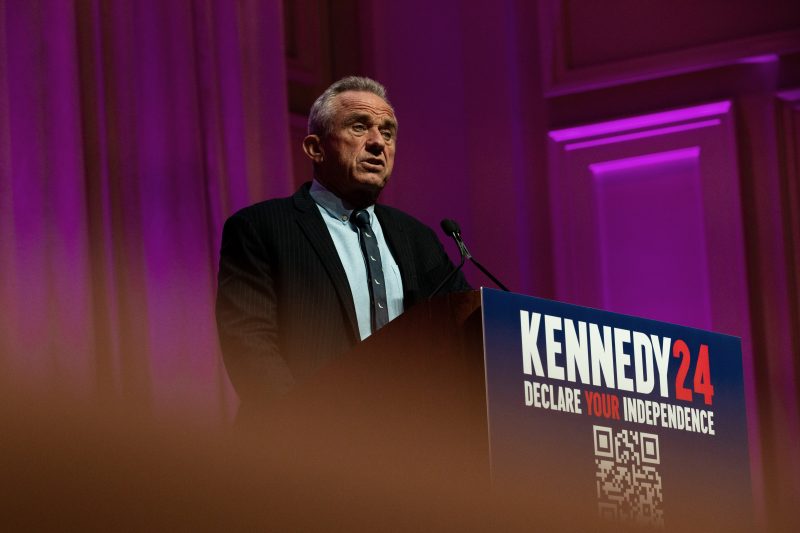
RFK says he didn’t read Alabama IVF ruling, declines to say when life begins
COSTA MESA, Calif. — A week after the Alabama Supreme Court ruled that frozen embryos are people, independent presidential candidate Robert F. Kennedy Jr. said he had not read the decision, and he would not say when he thinks life begins.
In an interview with The Washington Post, Kennedy said the Alabama decision on in vitro fertilization — which has caused some IVF clinics to pause services in the state — was a mistake “to the extent that it limited access to” the fertility procedure.
Kennedy did not say whether he would protect abortion access, arguing that while he believes women should “have the right to choose,” he thinks “there is a limitation on what the Constitution says.”
Asked what he would do to protect abortion access and reproductive rights if he were elected president, Kennedy said: “I don’t know, you tell me. What should I be doing?”
Kennedy, who left the Democratic Party his family once led to run as an independent, has struggled to outline a clear policy plan on abortion access and reproductive rights — an issue that has catapulted to the center of the 2024 election season.
At a time when Democrats have sought to galvanize their base around protecting reproductive rights, Kennedy’s answer reflects a difficulty he could face in appealing to his former party’s voters. Meanwhile, Republicans have scrambled to find unity over the issue that drove voters to opt for Democrats in the midterms and in more recent elections.
Kennedy has previously changed his stance or walked back his positions when asked about a federal abortion ban. In an interview with NBC News at the Iowa State Fair in August, Kennedy said that he believes “a decision to abort a child should be up to the women during the first three months of life” and that he would support an abortion ban at 15 or 21 weeks. His campaign later clarified that he “misunderstood” the question in the noisy space and that Kennedy “does not support legislation banning abortion.” In a town hall last June, he said he thinks women have a choice for the “first three months of pregnancy.” On Saturday, Kennedy told The Post, “Every abortion ultimately is a tragedy.”
Kennedy, who was speaking at the California Libertarian convention this weekend, also emphasized his belief in “medical autonomy” when asked about the Alabama decision, adding that he doesn’t think “the government should be making choices about medical treatments for Americans” or “for what people do with their bodies.” He has continued to campaign on doubting the safety and efficacy of the coronavirus vaccine and on arguing against vaccinate mandates.
That message, which has not resonated with Democrats, found appeal among libertarians at the convention. Kennedy and other third-party presidential candidates spoke to the delegates gathered this weekend in an effort to appeal to the party, which has garnered greater ballot access.
Kennedy said he had not ruled out the possibility of running for the Libertarian Party nomination. The California Libertarian delegates will informally throw their support behind candidates via straw poll on Sunday, while the party will formally choose its nominee at a national convention in May.
“We’re looking at every option,” Kennedy said.
The Kennedy campaign and the PAC supporting him, American Values 2024, have spent millions of dollars on getting his name on state ballots, and the Libertarian nomination could offer him an easier and less expensive path toward ballot access. Kennedy will be on the ballot in Utah, and the campaign says it has met the requirements for New Hampshire and Hawaii.
But Kennedy, a lawyer and environmental activist who has spent decades supporting Democrats, has also acknowledged his ideological differences with the Libertarian Party. He has faced criticism here over his support of Israel and for a $15 minimum wage.
“How can a supposed antiwar candidate promote that military funding and arming of the state of Israel in their genocidal campaign against the Palestine people?” Libertarian presidential candidate Michael Rectenwald said to the California delegates, a line that was met with applause.
Libertarian presidential candidate Jacob Hornberger said Kennedy could be “exploring renting” the party for ballot access, but it doesn’t make sense for Kennedy or the party to pair given their differences.
“He’s a big-government, gun-grabbing, welfare-state-loving, liberal Democrat, but he’ll portray himself as a libertarian,” Hornberger said. “He’s like a chameleon changing colors.”
